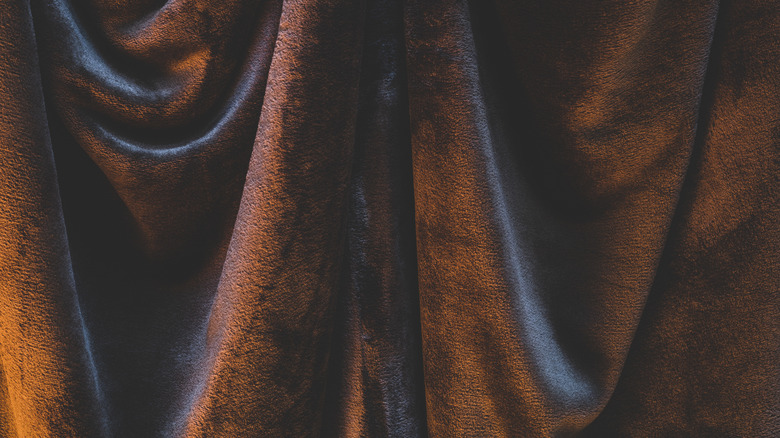Cotton Vs. Polyester Velvet Curtains: Which One's Right For You?
Velvet has been around for a long time, dating back to at least the 14th century. Back then, it was known as a luxurious material that was usually associated with royalty. Well, several hundred years later, that hasn't changed much. You can pick any of the myriad stylish ways to incorporate velvet into your home décor, and the end result would always scream class. Velvet works well for sofas, headboards, and even pillows, but one room-enhancing use of this fabric is as a curtain. Beyond the aesthetic appeal of having this sleek material as a floor-to-ceiling curtain, velvet also has some practical benefits, like light and sound insulation.
Traditionally, velvet was only made from silk. That made it pricey, leading to its association with the rich. Now, it's a bit different. Silk velvets still exist and remain the costlier option in the market. However, cheaper velvet items like this budget-friendly IKEA velvet curtain are available now, thanks to the variants of this fabric made from more economical materials like cotton and polyester. Now, if you're looking to cop yourself a brand new velvet curtain, you may be wondering which fabric type to go for. Both cotton and polyester velvets have their unique benefits and disadvantages you should know about, and we're here to help.
When should you go for cotton velvet curtains?
Cotton velvet curtains can be a great addition to your home. They are made from cotton, which gives the finished product a soft and comfortable feel. These curtains have a matte finish that looks a lot more premium than the shiny appearance of some other velvet types. Curtains made from this fabric are also breathable, allowing air and light in and making them better for warmer climates. Cotton velvet is equally hypoallergenic, which is great news for people with sensitive skin. Finally, if you're aiming for an eco-friendly material, this type of velvet should be your pick. Finally, 100% cotton velvet is completely biodegradable, so you can rest assured that your curtains won't end up polluting the earth in some landfill when you're done with them.
While cotton velvet is a great choice for your velvet curtains, you might want to take note of some of its downsides. The first is that this velvet is quite absorbent, which means that it attracts stains easily. This could mean either calling for professional cleaning services or having to try out this cleaning product to lift those stains from your velvet fabric. All in all, cotton velvet requires more maintenance than polyester, so you should keep that in mind. It is also the costlier option, so it might not be ideal if you're on a budget. These materials are less durable than the synthetic alternative and are also more susceptible to fading over time, so you should avoid placing them in high-traffic areas.
When are polyester velvet curtains better?
Polyester velvet curtains are a totally solid alternative to cotton velvet curtains, especially when you're on a budget. These curtains are made from synthetic polyester, which is typically more affordable than cotton velvet and gives a shiny look to the fabric. They are also really easy to maintain. Polyester velvet curtains are wrinkle-resistant, which means that they can look good for longer without needing a pass over with the steamer. Since they are not as absorbent as cotton, they get stained a lot less and require less cleaning. These types of velvet curtains are more durable than cotton velvet; when they do get dirty, you can wash them and not worry about them getting damaged. This durability also means that your curtain is more likely to do better in high-traffic areas better than cotton velvet.
Polyester velvet curtains also have their drawbacks. The first is their dust attraction. Sure, they might not get stained as easily as cotton velvet, but the static electricity produced by the fibers attracts more dust particles. The material is also less breathable than cotton velvet, so rooms in warmer climates might feel stuffy with it. Polyester velvet is also non-biodegradable, so the eco-conscious homeowner may want to find another option. That shiny look may come off as cheap in some curtains, so ensure you choose wisely.


